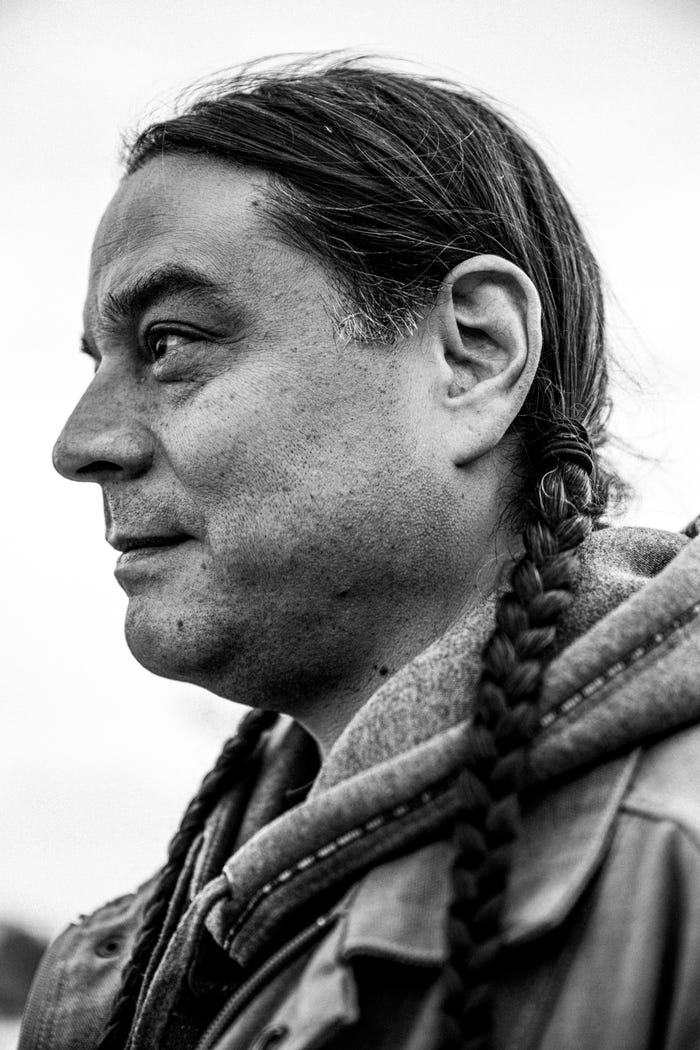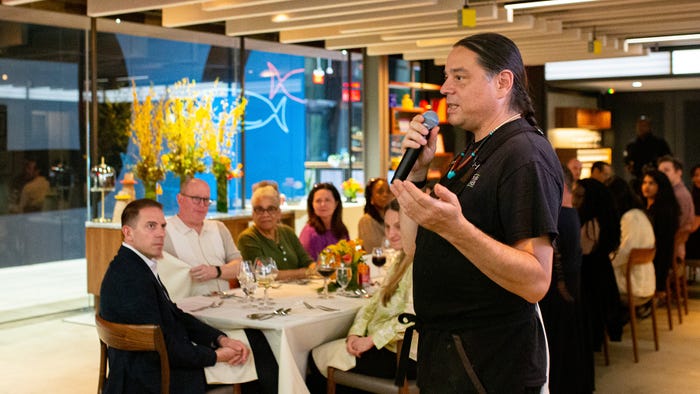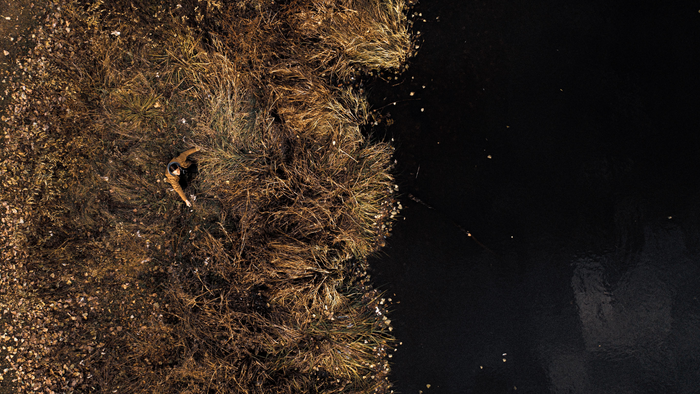‘We have to be smarter humans’: Sioux Chef Sean Sherman fosters change through food
The Expo West 2024 keynote speaker will address colonization and privilege from Indigenous perspectives. Learn more about Sean Sherman and his mission.
March 8, 2024

Watch Sioux Chef Sean Sherman's keynote address, available on demand here.
On the cusp of turning 50, Sean Sherman, also known as the Sioux Chef, views his life’s work as far from done, but also as just the starting point for the next generation to carry on.
“I feel like I have X amount of good years in my life to really do this good work,” says Sherman, who will deliver the keynote speech at Natural Products Expo West 2024. “I really wanted to set it up for the next generation to take it further than I can in my lifetime—and to really do something with it, but to lay out some groundwork for the next generation to have the tools they need to be able to do this.”
“This” refers to Sherman’s multipronged efforts to revitalize and evolve Indigenous food systems throughout North America. He does this through his Minnesota-based restaurant, Owamni; through his nonprofit association, North American Traditional Indigenous Food Systems (NĀTIFS); through his James Beard Award–winning cookbook, “The Sioux Chef’s Indigenous Kitchen”; and through the impact of landing on Time magazine’s 2023 list of the 100 Most Influential People.
But Sherman does not do what he does for the glory. His motivation comes instead from a deep sense of care and concern for his community and all American Indian tribes whose culture and health have been compromised, if not destroyed, by colonization—a scourge, he adds, that “is not dead.”
“It's still happening all over the globe,” Sherman says. “You see it with the conflicts in Ukraine and the Middle East and what’s happening in Congo or the rainforest, where they’re still murdering Indigenous communities for the sake of the resources that they deem valuable there.”
At Expo West, more than recounting how he went from living on one of the poorest reservations in the country to making his name as the Sioux Chef, expect Sherman to talk at length about such atrocities and the risk of repeating history. He aims to “wake people up a little bit, because we're living in an era where they're starting to go backwards and take away Black and Indigenous histories out of comfort,” he says. “That's just because white supremacy is very fragile and does not like to be challenged at all.”
From that perspective, Sherman offers ways to empower Native people to reclaim their ancestral connections and health. And it all begins with a return to traditional ways of eating.
“If you control your food, you control your destiny,” he told audiences during a 2023 talk at Johnson & Wales University.

Chef Sean Sherman's goal is to revitalize and evolve Indigenous food systems throughout North America. Credit: Bill Phelps
Powdered milk and corn syrup
Having grown up on the Pine Ridge Reservation in South Dakota, Sherman knows how far out of control most American Indians have become in terms of their food supply. For example, as he told NPR in 2022, he ate “powdered milk with very dry cereal … and pure corn syrup … just to make things taste better.”
Of course, at the time, Sherman, like the people around him, considered commodity and processed foods to be normal.
“It wasn't until later, when I started working in restaurants and started learning about food and health, that I really started to look backwards and [see] how unhealthy it is,” Sherman says. “It’s the reason why there's so much type 2 diabetes and obesity and heart disease and all this food-borne illness,” he says of the now-normalized, arguably institutionalized, Native American approach to eating.
To this day, most residents of the Pine Ridge Reservation shop for food at the gas station, Sherman says. Their other options? One grocery store in an area the size of Connecticut, or else Taco John’s or Subway.
All of that is a far cry from the wild and foraged grains, game, fish, fruits and vegetables upon which traditional Native fare is based—and upon which Sherman builds his recipes and life’s work.
You can witness all that (and more) in action if you have the chance to visit his Owamni restaurant in Minneapolis. Don’t look for gluten-, dairy- and sugar-filled foods, all staples of a European, not Native, diet. Instead, you might get literal crickets or some other “really fun food,” Sherman says. The joy, for him, lies in offering “a bunch of options to taste” in an authentic setting.
“You’ll hear Native music on the speakers, see Native staff who speak Native languages,” Sherman says. “Get that experience all in one package.”

Chef Sean Sherman speaks to diners during his James Beard residency in 2023.
Pushing back against ‘normal colonial values’
Much of Sherman’s motivation ties to helping as many people as possible to learn more about Indigenous histories, food systems and cultures��—and to promote the importance of protecting the environment for the sake of everyone’s future. It’s past time to push back “against these normal colonial values of taking resources for capitalistic perspectives,” Sherman says. “We have to be smarter humans, and we're not there.”
Make no mistake, though: Sherman and his team serve a vast swath of people, not a select few. To that point, not only does Sherman run Owamni in Minneapolis for anyone to enjoy, there’s also a food lab and production kitchen for teaching the cooking of Indigenous dishes. In addition, he and his team provide community outreach and support.
Recall, for instance, the chaos of 2020.
Smack in the middle of COVID-19, “George Floyd was murdered just a few blocks from us and the street that we're on,” Sherman says. “Everything got completely decimated during the social uprising. So our team got together and started doing food relief because that social uprising directly impacted what was available to our community here.”
That same summer, Sherman adds, the homeless population skyrocketed. “We were doing 400 meals a day, doing what we do with healthy Indigenous foods only,” he says. “And that turned into 10,000 meals a week out of a very small kitchen with a staff of about a dozen people and lots of volunteer help.”
These days, Sherman and his team are continuing to act on their vision of uplifting people through food by breaking into the wholesale world. This will allow them to distribute Indigenous foods for menus and recipes in settings including a school on the Pine Ridge Reservation. In fact, Sherman hopes to work with all tribal school and hospital systems. And eventually, he envisions branches of Owamni throughout North America to bring Indigenous foods and experiences to anyone who’s interested.
“I see so much work to do,” he says. “I see a unique opportunity to do some things that can be very impactful, that could actually be systematic changes that can connect Indigenous peoples on a global scale. And it can really showcase the true value of us as Indigenous peoples and people of color in general by pushing back against colonial values.”
But again, he brings up his limited years left to do this work. “Eventually, I want to pass this on and disappear into Belize or somewhere,” Sherman says. “But for now, I have all this drive to make this happen, to use this voice in this platform.”

Credit: Bill Phelps
Food as power
At Expo West, Sherman will use his voice to spur attendees to think about inequality and colonization—and the lack of sense that all makes, especially when it comes to the availability of healthy, nourishing food.
“I feel very lucky to have the opportunities I've had to get to where I'm at right now—and to be able to do this with so much intention, not with the ego that's typical with so many culinary projects,” he says. “So many times we've seen in Western cultures a chef being like, ‘I have discovered the secret. We’re gonna do everything from farm to table and … this amazing farm and this high-end restaurant.’”
That all might sound great, but Sherman points out an important caveat that those chefs typically don’t discuss. “They don't talk about the privilege of having access to a multibillion-dollar farm estate and a fancy restaurant where people are spending $800 per person to dine,” he says. “And who is that actually helping? And so privilege was a huge part of this too, because what we're doing is trying to impact people where fine dining isn’t even a part of their vocabulary.”
While the road ahead will be long and difficult, Sherman is anything but daunted. He sees the possibility of widespread change for Indigenous and other peoples, with the next big shift led by the upcoming generation. To facilitate that, he says it is imperative to teach—now—how and why America, in particular, reached its current state of imbalance.
“We're going the wrong direction in so many areas right now, and we need some beacons of hope and some beacons of positivity out there,” Sherman says. “And it's not about political leanings. It's not about color of skin. We need to learn how to be human. We need to learn how to side with humanity over all of our decisions, and we need to understand what morality means, not just side with laws that can be twisted for any reason.”
And of course, this ties directly back to food and culture. “So, what, and how, can we feed our fellow humans?” Sherman asks. “How can we understand our diverse cultures and protect those cultures instead of just wiping them off the map if they don't fit in?”

About the Author
You May Also Like


